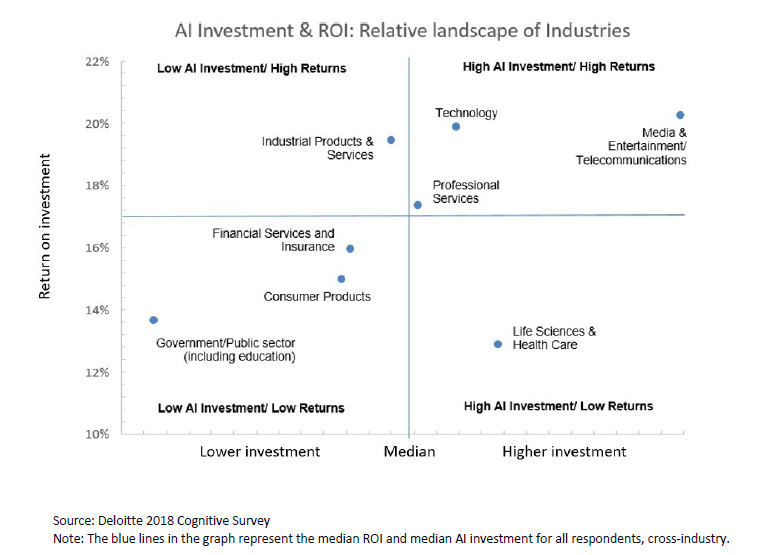AI delivering returns for enterprise early adopters, but not industries created equal

Artificial intelligence spending is ramping as 82 percent of early adopters say they have seen positive returns on investment, according to Deloitte. But there are issues that are emerging as AI goes more mainstream.
According to Deloitte's State of AI in the Enterprise report, the median ROI on an AI project is 17 percent. Deloitte surveyed 1,100 U.S. executives with early AI projects under way.
However, not all industries have fared well with AI. For instance, life sciences and health care have invested heavily in AI with lower returns relative to technology and telecom firms.
Primers: What is AI? Everything you need to know about Artificial Intelligence | Machine learning? | Deep learning? | Artificial general intelligence?

Deloitte noted:
Healthcare and life sciences companies are investing in AI but, according to our data, have less to show for it. Certainly, some healthcare "big bang" projects have disappointed thus far. However, advances in fields as diverse as radiology and hospital claims management show that AI offers substantial potential for value in healthcare, despite some high-profile stumbles. For example, in a recent study, deep- learning neural networks identified breast cancer tumors with 100 percent accuracy by analyzing pathology images. Such advances, however, are only in the lab and will likely take time before entering clinical practice.
For early adopters, 63 percent have launched machine learning with 62 percent using natural language processing. Computer vision was used by 57 percent and deep learning neural networks were deployed by half the Deloitte respondents. Enterprise software with AI baked in has been one big avenue to get started followed by co-development with partners and cloud services.
Like many new technologies, early adopters often race ahead and garner early returns. When more companies, say the No. 3 player in an industry, adopt a new technologies more potholes appear.
Why AI and machine learning are driving data lakes to data hubs | Tech Budgets 2019: A CXO's Guide
Respondents had concerns about AI with 32 percent of the execs survey saying they've had an AI-related breach in the last two years. These cybersecurity worries have shelved AI plans for 1 in 5 respondents. In addition, 40 percent of respondents said they were concerned about AI systems and legal and regulatory risks.
Meanwhile, 32 percent of respondents said ethical risks were also a major concern. IBM has been positioning its AI management tools as a way to detect and correct bias in models. Enterprises are concerned about AI spreading false information and skewing recommendations in multiple areas.
Deloitte noted that 52 percent of respondents had an AI implementation roadmap with 37 percent stating they had a comprehensive strategy in place.
Other key points in the Deloitte survey:
- 63 percent are suing AI to keep up or edge ahead of competitors.
- 37 percent said AI is helping their companies widen a lead.
- 11 percent say that AI is of critical strategic importance today.
- 42 percent say AI will be of critical strategic importance two years from now.
- The share of respondents who think AI will transform their companies or industries within three years is down 20 percent from a year ago.
- 69 percent of respondents say they are facing a moderate, major or extreme skills gap in AI. Researchers to invent new algorithms and systems as well as software developers and data scientists were the skills most in demand.
- 10 percent of respondents said they had a clear preference for retraining and keeping current employees as AI is deployed.
- 78 percent said they lean toward either toward keeping or replacing employees in equal measure or replacing workers with new talent.
Also: The AI, machine learning, and data science conundrum: Who will manage the algorithms? | IBM launches tools to detect AI fairness, bias and open sources some code